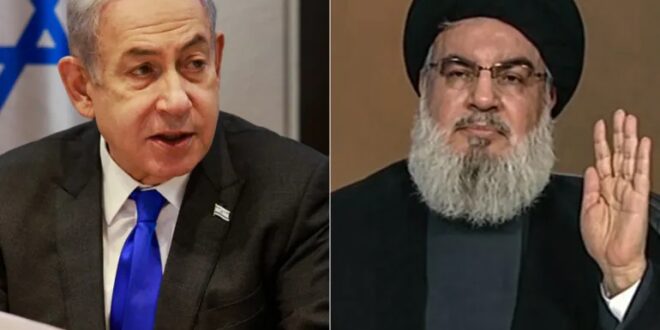Israel’s PM Netanyahu may be trying to extend his country’s conflicts to maintain his hold on power, analysts argue.
After Israel killed at least one person in an attack on Baalbek, its second attack on eastern Lebanon since October 7, a reported 100 rockets were fired from Lebanon into Israel, triggering sorties by Israeli fighter jets attacking various locations in Lebanon.
The escalation on Monday night and into the day on Tuesday may well be fodder for more speculation by analysts who feel Israel may turn its full focus to the Lebanese front if a Gaza ceasefire is established.
As attacks continued from Monday night into the day on Tuesday, including more attacks on Baalbek, the theory seemed more plausible to some.
“Israel made it clear that once they are done with Gaza, they will turn their attention to the north,” Hilal Khashan, a professor of political science at the American University of Beirut, said.
“They want Hezbollah away from their border [be it] diplomatically or militarily. They’ve been clear on this matter.”
Israel’s relentless war on Gaza has killed more than 31,000 Palestinians since an October 7 attack on Israel by Hamas’s Qassam Brigades and other Palestinian armed factions, when 1,139 were killed.
Recent ceasefire talks in Cairo ended without a resolution, meaning the human catastrophes will continue for now, including the very real prospect of famine, with people in Gaza already starving to death.
To the north, Lebanese group Hezbollah has engaged Israel with cross-border attacks since Israel launched its attacks on Gaza.
More than 300 people have been killed in Lebanon, including some 240 members of Hezbollah, while about 20 Israelis have been killed in the cross-border violence.
The fighting has also forced some 90,000 people to flee southern Lebanon, according to a report released in late February by the International Organization for Migration, while in Israel 80,000 people were evacuated from northern towns and villages by the Israeli government, according to Israeli media.
While attacks had initially been close to the border, the Israeli military has launched targeted attacks as far north as Beirut and recently hit near the city of Sidon, about a half-hour drive from the capital, and near Baalbek in the east.
“Israel is expanding the circle of war little by little but so far there is no decision for a comprehensive war,” Kassem Kassir, an analyst close to Hezbollah, told Al Jazeera.
“[Hezbollah] cannot withdraw [from the conflict] before stopping the war on Gaza and agreeing on a comprehensive solution.”
Israel is demanding that Hezbollah pull their forces back behind the Litani River, roughly 30km (19 miles) north of the border, but analysts said that seems unlikely to happen.
“If Hezbollah pulls out of the south they would have to disarm and I don’t think they’d agree diplomatically,” Khashan said. “[But] if Hezbollah does not pull out, Israel will take action.”
Mounting pressure on Netanyahu
As the human toll continues to mount in what is now the war’s sixth month, pressure is mounting on Israeli Prime Minister Benjamin Netanyahu.
Some analysts have suggested that Netanyahu wants to keep Israel at war – either in Gaza or with Hezbollah in Lebanon – because it is the best way for him to remain at the country’s helm.
January witnessed large protests against the Netanyahu government, with captives still held in Gaza appearing to be no closer to their release. And disapproval is not only internal.
“Netanyahu’s desire to [keep the country at war to] claim a victory is evidence of a deep internal rift and the increasing condemnation from the international community,” Imad Salamey, associate professor of political science and international affairs at the Lebanese American University in Beirut, told Al Jazeera.
Mutual claims of victory
The Biden administration has recently adopted a harsher tone towards Netanyahu’s government, the most far-right in Israel’s history, while at the same time, Biden refuses to condition military aid and the continued supply of weapons to Israel.
Netanyahu’s most likely successor to the premiership, Benny Gantz, visited Washington last week and met with senior American officials, in what some analysts said was an attempt to shift Israeli policy.
But barring a radical departure from the current trajectory, a more focused confrontation between the Israeli military and Hezbollah could still be on the cards.
An Israeli journalist recently reported that a Larnaca-based port used for checking goods set to be delivered to Gaza could double as an alternative to the Port of Haifa, should it be shut down in the case of an intensification of the conflict with Hezbollah.
Most Israelis believe the state should act against Hezbollah in some capacity, according to a survey conducted by the Israeli Maariv newspaper, while half the country says a war against Hezbollah should be a last resort to restore border security, according to a poll by the Israel Democracy Institute think tank.
“Neither side intentionally wants to widen the war because the cost would be devastating compared to any political win,” Salamey said.
Hezbollah chief Hassan Nasrallah said in February that a ceasefire in Gaza would end its military operations. But some believe Israel will not be satisfied by that.
Khashan said a scenario could unfold that involves Israel launching an intensified military operation on Lebanon post-Gaza that would eventually lead to a diplomatic solution, possibly including Hezbollah retreating from the border areas. It would be an “outcome that will give both parties a claim to victory, similar to 2006”.
But until a ceasefire is announced in Gaza, uncertainty hangs over Lebanon, with the potential for another catastrophic war just around the corner.
 Eurasia Press & News
Eurasia Press & News




